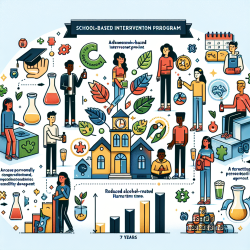As practitioners dedicated to improving adolescent health outcomes, we constantly seek effective strategies to prevent alcohol misuse among young people. The recent study titled "Effect of Selective Personality-Targeted Alcohol Use Prevention on 7-Year Alcohol-Related Outcomes Among High-risk Adolescents" offers valuable insights into a promising approach that targets specific personality traits linked to substance use. This blog explores how implementing these findings can enhance your practice and encourage further research.
The PreVenture Program: A Brief Overview
The PreVenture program is a school-based intervention designed to address personality traits associated with an increased risk of alcohol misuse. These traits include anxiety sensitivity, negative thinking, impulsivity, and sensation seeking. By providing adolescents with coping skills tailored to their unique personality profiles, the program aims to reduce the likelihood of alcohol use as a coping mechanism.
Key Findings from the Study
The study conducted a secondary analysis of a cluster randomized clinical trial involving 438 participants from 14 secondary schools in Australia. The results demonstrated that the PreVenture intervention significantly reduced the odds of alcohol-related harms and decreased the frequency of such harms over a 7-year follow-up period. Key findings include:
- Reduced Odds of Alcohol-Related Harms: Participants who underwent the PreVenture program experienced a sustained reduction in alcohol-related harms compared to the control group.
- Long-Term Efficacy: The intervention's positive effects persisted from early adolescence (13.5 years) into early adulthood (20.5 years).
- No Significant Impact on Binge Drinking or Hazardous Use: While the program effectively reduced alcohol-related harms, it did not significantly impact monthly binge drinking or hazardous alcohol use at the 7-year follow-up.
Implications for Practitioners
The findings highlight the potential of personality-targeted interventions in reducing alcohol-related harms among high-risk adolescents. As practitioners, we can leverage these insights to enhance our preventive strategies:
- Incorporate Personality Assessments: Integrate assessments that identify personality traits linked to substance use into your practice. This will help tailor interventions to address specific risk factors effectively.
- Focus on Skill Development: Emphasize practical skill development in coping with emotions and behaviors related to personality traits. This approach can empower adolescents to manage their reactions without resorting to alcohol use.
- Collaborate with Schools: Partner with educational institutions to implement school-based programs like PreVenture. These collaborations can extend your reach and impact within the community.
Encouraging Further Research
The study's findings open avenues for further exploration into selective prevention programs. Researchers can investigate:
- Longer-Term Effects: Examine whether the positive outcomes observed in this study persist beyond early adulthood.
- Diverse Populations: Explore how personality-targeted interventions perform across different cultural and demographic groups.
- Integration with Other Programs: Assess the effectiveness of combining personality-targeted interventions with other preventive strategies for comprehensive outcomes.
The study underscores the importance of delivering evidence-based prevention in schools and highlights the need for continued investment in school-based initiatives. By focusing on developing personality-specific coping skills rather than solely addressing alcohol use, programs like PreVenture offer scalable solutions for reducing alcohol-related harms among young people.
If you're interested in delving deeper into this research, I encourage you to read the original paper: Effect of Selective Personality-Targeted Alcohol Use Prevention on 7-Year Alcohol-Related Outcomes Among High-risk Adolescents.
Together, we can make significant strides in preventing alcohol misuse and promoting healthier futures for our youth.










